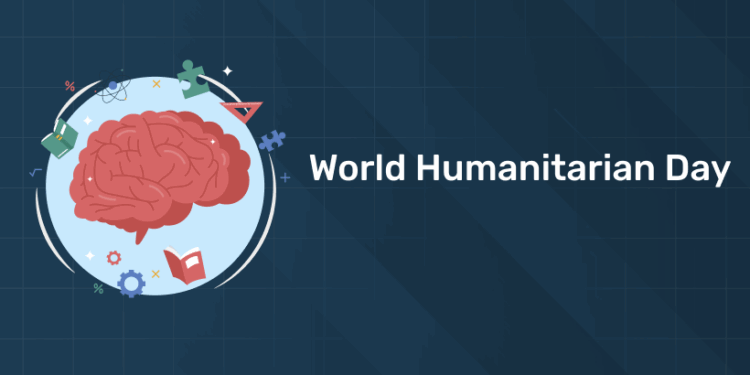Table of Contents
Every August 19th, the global community comes together to observe World Humanitarian Day, a time dedicated to honoring those who have dedicated their lives to humanitarian work and raising awareness about the ongoing struggles faced by millions around the world. Recognized by the UN General Assembly from 2009 onwards, World Humanitarian Day celebrates the vital contributions of humanitarian workers worldwide. In 2025, the theme “No matter what” highlights the need for global collaboration to address humanitarian crises and support the world’s most vulnerable.
World Humanitarian Day 2025 Date – August 19
In this article readers can get a glimpse on
- History and Celebration of World Humanitarian Day
- World Humanitarian Day Theme 2025
- World Humanitarian Day Quiz
World Humanitarian Day
1: Who was the first woman President of India?
World Humanitarian Day, observed every August 19th, is an international day dedicated to recognizing the bravery and dedication of humanitarian personnel and those who have lost their lives in the line of duty. This day serves as a tribute to the countless aid workers who risk their lives to provide assistance in crises around the globe and as a call to rally support for those affected by disasters and conflicts.
While our culture often idolizes movie stars, athletes, and politicians, it’s crucial to remember and celebrate our real-life heroes—the humanitarian workers who selflessly dedicate their lives to helping others. These individuals, whether they’re local responders in the aftermath of a natural disaster or volunteers offering aid in conflict zones, embody true heroism.
Consider recent events like the devastating flight disaster in Kerala or the volcanic eruption in Indonesia. In these crises, local communities often step up as the first responders, providing critical assistance even before official authorities arrive. Their swift and courageous actions are a testament to the power of human compassion and solidarity.
World Humanitarian Day 2025 is a reminder to honor and admire these real-life heroes who are driven not by fame or recognition, but by a profound commitment to humanity. Let’s take this day to celebrate their contributions and acknowledge their invaluable role in making the world a better place.
Free UPSKILLING Courses!
Take your first step toward mastering in-demand skills, acing interviews, and securing top-tier jobs with Entri's free upskilling courses.
Start Learning!The Meaning of World Humanitarian Day
World Humanitarian Day, observed on August 19th, honors the courage and dedication of humanitarian workers who risk their lives to help others in crisis. Established by the UN in 2008 and recognized officially in 2009, this day commemorates those who have lost their lives in humanitarian service, including Sérgio Vieira de Mello, who died in the 2003 Baghdad bombing.
The day raises global awareness about humanitarian issues, advocates for increased support and resources, and promotes solidarity and compassion. It reminds us of the critical role of aid workers and encourages collective action to address and alleviate human suffering worldwide.
Humanitarian Day 2025 Theme
The theme for World Humanitarian Day 2025 is “Strengthening Global Solidarity and Empowering Local Communities.”
This theme highlights the importance of international cooperation and local leadership in addressing humanitarian crises. The focus is on working alongside communities not just as recipients of aid, but as partners who are at the center of planning and implementing effective, long-term solutions. It emphasizes the crucial role of local responders and organizations in building resilience and shaping their own future.
History of World Humanitarian Day
From 2009 onwards, the United Nations Office for the Coordination of Humanitarian Affairs observes August 19 as the World Humanitarian day across the globe. But what makes the UN accept August 19 as the Humanitarian day, let’s check the brief history behind this day.
Sérgio Vieira de Mello was a Brazilian diplomat who works for the UN for 34 long years in challenging humanitarian situations. His relentless efforts during the Mozambique Civil war (followed its independence from Portugal in 1975) as UNHCR representative, and in Cambodia as the first and only UN Representative to hold talks with the Khmer Rouge were widely applauded. He was involved in the clearing of land mines in Cambodia, and then in Yugoslavia. Mello’s works were indispensable in dealing with the issue of ethnic minorities like Tanka people in Hong Kong. In May 2003 Vieira de Mello was appointed as the Special Representative of the UN Secretary-General to Iraq.
Canal Hotel Bombing
In the afternoon of August 19, 2003, a suicide bomber driving a truck bomb charged to the premises of the Canal Hotel and makes the whole area a column of smoke. The target was the five days older UN Assistance Mission to Iraq. The United Nations Office for the Coordination of Humanitarian Affairs Humanitarian Information Centre (HIC) for Iraq (UNOHCI) and the office of Sérgio Vieira de Mello, the UN High Commissioner for Human Rights, located in the premises were directly hit by the bombing. It killed Sergio Vieira de Mello and 22 other UN staff.
The terrorist organization Jama’at al-Tawhid wal-Jihad, specifically targeted Vieira de Mello in the blast. The reason given by Abu Musab al-Zarqawi (leader) for targeting Vieira de Mello was that he had helped East Timor become an independent state. He said, “Vieira de Mello had participated in the unlawful removal of territory from the Islamic Caliphate and was, therefore, a thief and a criminal”.
To keep-alive de Mellos contributions towards the humanitarian crisis, and to convey deep gratitude for him and his 21-colleagues, and all humanitarian personnel who have lost the life, UN General Assembly declared August 19, as the World Humanitarian day from 2009 onwards.
Free UPSKILLING Courses!
Take your first step toward mastering in-demand skills, acing interviews, and securing top-tier jobs with Entri's free upskilling courses.
Start Learning!Humanitarian Day Celebrations 2025
This year World Humanitarian Day highlights the immediate human cost of the climate crisis in order to take meaningful climate action for the world’s most vulnerable people. According to the UN:
The climate emergency is wreaking havoc across the world at a scale that the humanitarian community and people at the front lines cannot manage.
Time is already running out for millions of the world’s most vulnerable people – those who have contributed least to the global climate emergency but are hit the hardest.
Millions of people are already losing their homes, their livelihoods, and their lives.
With most climate campaigns focused on slowing climate change and securing the planet’s future, World Humanitarian Day 2025 will highlight the immediate human cost of the climate crisis and pressure world leaders to take meaningful climate action for the world’s most vulnerable people.
World Humanitarian Day Activities 2025
World Humanitarian Day, observed on August 19th, is an opportunity for individuals and communities worldwide to honor humanitarian workers and support those affected by crises. Here are some meaningful activities and actions you can take to participate in this important day:
Support Humanitarian Organizations
- Donate: Contribute to reputable humanitarian organizations that provide aid to those in need. Your donation can help fund emergency relief efforts, medical care, and other critical services.
- Fundraise: Organize or participate in fundraising events to support humanitarian causes. This could include charity runs, auctions, or virtual fundraisers.
Raise Awareness
- Social Media Campaigns: Use your social media platforms to spread awareness about World Humanitarian Day. Share stories of humanitarian workers, information about ongoing crises, and ways people can contribute.
- Educational Workshops: Host or attend workshops, webinars, or discussions that focus on humanitarian issues, the role of aid workers, and how individuals can get involved.
Volunteer Your Time
- Local Volunteering: Offer your time to local organizations that support humanitarian causes. This could involve helping at shelters, food banks, or community outreach programs.
- Virtual Volunteering: Many organizations offer remote volunteering opportunities. You could assist with tasks such as administrative support, translation services, or online advocacy.
Participate in Community Events
- Charity Events: Attend or organize charity events such as benefit dinners, concerts, or art exhibitions. These events often raise funds and increase awareness about humanitarian efforts.
- Public Vigils or Tributes: Join or host a vigil or tribute event to honor humanitarian workers who have lost their lives. These gatherings can serve as a powerful reminder of their sacrifices.
Advocate for Change
- Policy Advocacy: Support and advocate for policies that address the root causes of humanitarian crises, such as poverty, inequality, and climate change. Engage with policymakers to push for meaningful action.
- Petitions: Sign or promote petitions that call for increased humanitarian aid or support for specific causes.
Engage in Acts of Kindness
- Random Acts of Kindness: Perform acts of kindness in your community, such as helping a neighbor, donating to local charities, or participating in clean-up drives.
- Support Local Heroes: Recognize and thank local volunteers and first responders who contribute to humanitarian efforts in your area.
Educate Yourself and Others
- Learn More: Take the time to educate yourself about global humanitarian issues, the challenges faced by aid workers, and the impact of various crises.
- Share Knowledge: Use your knowledge to educate others about the importance of humanitarian work and the ways they can get involved
World Humanitarian Day Quiz 2025
B) United Kingdom
C) Germany
3. What percentage of humanitarian crises are linked to climate-related disasters?
A) 40%
B) 70%
C) 90%
A) 65
B) 116
C) 152
5. Which organization coordinates UN humanitarian emergency responses?
A) UNHCR
B) OCHA
C) UNICEF
A) Every week
B) Every three days
C) Every day
A) 2003
B) 2009
C) 2012
A) Independence
B) Neutrality
C) Solidarity
A) Hague Convention
B) Geneva Conventions
C) Paris Agreement
Want More Engaging Questions?
Download our FREE PDF packed with insightful quiz questions to test your knowledge!
🔽 Click below to get your free copy now! 🔽
World Humanitarian Day Quiz 2025 PDF
World Humanitarian Day is more than a date on the calendar; it is a call to recognize and support those who put their lives on the line for others. From conflict zones to disaster-hit areas, humanitarian workers embody courage, compassion, and commitment. The day also helps shed light on urgent crises that often go unnoticed in the media. By honoring their efforts, we also remind ourselves of the shared responsibility to care for vulnerable communities. Every gesture of support, big or small, contributes to saving lives and restoring hope.
Beyond recognition, this day encourages action from people worldwide. Governments, organizations, and individuals are urged to provide resources and assistance where it is most needed. It fosters solidarity across borders and cultures, strengthening the global humanitarian network. In a world facing climate disasters, conflicts, and displacement, humanitarian aid remains a lifeline. World Humanitarian Day reminds us that humanity is strongest when we stand together for those in need.
Free UPSKILLING Courses!
Take your first step toward mastering in-demand skills, acing interviews, and securing top-tier jobs with Entri's free upskilling courses.
Start Learning!Frequently Asked Questions
What is World Humanitarian Day?
World Humanitarian Day is observed every year on August 19. It honors humanitarian workers who risk their lives to help others. The day also raises awareness about global humanitarian needs. It was established by the United Nations in 2009. The date marks the anniversary of the 2003 bombing of the UN headquarters in Baghdad.
Why is World Humanitarian Day important?
It highlights the bravery of humanitarian workers in crisis zones. Many face danger, difficult conditions, and limited resources. The day reminds the world of ongoing humanitarian challenges. It encourages governments and citizens to support relief efforts. This recognition helps inspire continued global compassion and action.
Who organizes World Humanitarian Day activities?
The United Nations coordinates global events and campaigns. Its Office for the Coordination of Humanitarian Affairs (OCHA) leads the effort. NGOs, charities, and community groups also join in. Activities include awareness drives, storytelling, and public events. Social media campaigns help spread the message worldwide.
What happened in Baghdad on August 19, 2003?
A bomb attack targeted the UN headquarters in Baghdad, Iraq. Twenty-two people were killed, including Sergio Vieira de Mello. Many humanitarian workers were injured in the blast. This tragedy highlighted the risks faced in the field. It became the reason for choosing August 19 for this day.
What is the role of humanitarian workers?
They provide food, shelter, and medical care in emergencies. They work in areas affected by war, disasters, or epidemics. Their goal is to save lives and protect human dignity. Many also help communities rebuild after crises. They often work under dangerous and stressful conditions.
What are the main principles of humanitarian work?
Four core principles guide humanitarian action. These are humanity, neutrality, impartiality, and independence. Humanity means protecting life and dignity. Neutrality ensures no side is favored in a conflict. Impartiality and independence ensure aid reaches those who need it most.
How can people support World Humanitarian Day?
They can donate to trusted humanitarian organizations. Volunteering locally or abroad is another way to help. People can share stories on social media to raise awareness. Attending events or campaigns also shows support. Even small acts of kindness contribute to humanitarian efforts.
What challenges do humanitarian workers face?
They often work in war zones or disaster areas. Risks include violence, disease, and harsh conditions. Limited resources make their jobs harder. Political barriers can also delay aid delivery. Despite these challenges, they continue their mission.
How is humanitarian aid funded?
Funding comes from governments, organizations, and private donors. The largest contributions often come from developed countries. NGOs also run donation campaigns for public support. Emergency funds are set aside for sudden crises. Continuous funding is vital for long-term recovery projects.
What impact does World Humanitarian Day have globally?
It brings attention to crises that may be overlooked. It strengthens global solidarity and compassion. Donations and volunteer numbers often increase after campaigns. Governments may renew commitments to humanitarian laws and aid. The day serves as a reminder of our shared humanity.












